初三上册英语单元知识点
人教版九年级英语上册各单元知识点汇总

人教版九年级英语上册各单元知识点汇总UNIT1 How can we become good learners?SectionA重点单词听,并跟读下列单词l. textbook n.教科书;课本2. conversation n.交谈;谈话3. aloud adv.大声地;出声地4. pronunciation n.发音;读音5. sentence n.句子6. patient adj.有耐心的n.病人7. expression n.表情;表示;表达方式8. discover v.发现;发觉9. secret n.秘密;秘诀adj.秘密的;保密的10. grammar n.语法l1. repeat v.重复;重做l2. note n.笔记;记录v.注意;指出13. pal n.朋友;伙伴14. chemistry n.化学15. memorize v.记忆;记住16. pattern n.模式;方式听,并跟读下列单词变形。
l. conversation —converse (v.会话)2. patient —patience (n.耐心)3. expression —express (v.表达)1. discover —discovery ( n.发现)5. improve —improvement( n.改善)重点短语听,并跟读下列短语。
l. make word cards 制作单词卡片2. ask sb. for ... 向某人寻求……3. have conversations with sb. 和某人谈话4. at first 起初, 起先5. give a report 做报告6. take notes 记/做笔记7. word by word 逐词地8. so... that 如此……以至于9. write e-mails to sb. 给某人写电子邮件10. be afraid to do sth. /be afraid of doing sth.害怕做某事11. because of 由于;因为12. fall in love with 爱上13. a piece of cake 小菜一碟14. look up( 在词典、参考书中或通过电脑)查阅;抬头看15. so that 以便重点句型听,并跟读下列句子。
九年级英语上册单元重要知识点总结

九年级英语上册单元重要知识点总结九年级英语上册共有8个单元,包括Unit 1 My New Teachers、Unit 2 How Often Do You Exercise、Unit 3 I'm more outgoing than my sister、Unit 4 Don't eat in class、Unit 5 What are the shirts made of、Unit 6 I'm going to study computer science、Unit 7 Would you mind turning down themusic、Unit 8 How do you make a banana milk shake?下面对每个单元的重要知识点进行总结:Unit 1 My New Teachers1.介绍自己和他人的基本信息,包括姓名、年龄、学校、家庭成员等。
2.学习询问他人的基本信息,如What's his/her name? How old is he/she?Which school does he/she go to?等。
3.学习询问他人的职业和爱好,如What does he/she do? What are his/herhobbies?等。
4.学习表达个人的职业和爱好,如I'm a student. My hobbies are playingbasketball and listening to music.等。
Unit 2 How Often Do You Exercise1.学习询问他人的日常活动频率,如How often do you exercise? Howoften does he/she watch TV?等。
2.学习回答关于日常活动频率的问题,如I exercise three times a week.He/She watches TV every day.等。
人教版初三英语上册知识点汇总

九年级英语上册知识点汇总Unit1 The Changing World Topic1 Our country has developed rapidly.【短语和句型归纳】1.have a good summer holiday暑假过得愉快e back from从......回来3.have/has been to去过4.have/has gone to去了5.not...any more再也不...6.take photos照相7.by the way顺便问一下8.take part in参加9.around/all over/throughout the world全世界10.tell sb.something about...告诉某人关于某事11.have/live a happy/hard life过着幸福/艰苦的生活12.describe...in detail详细描述13.give support to支持...14.see...oneself亲眼看见15.keep in touch with与...保持联系16.far away遥远的17.kinds/sorts of各种各样的...18.not only...but also不仅...而且...19.make progress取得进步20.more than/over多于21.develop/improve rapidly迅速发展/改善22.tell sb.(not)to do sth.告诉某人(别)做某事23.ask sb.(not)to do sth.要求某人(别)做某事24.in order to do sth.为了做某事25.have to do sth.不得不做某事26.It s+形容词+for sb.to do sth.对于某人来说做某事是...的27.why not do sth.为什么不做某事28.succeed/be successful in doing sth.成功地做某事29.dream about doing sth.梦想做某事30.see/hear sb.do/doing sth.看见/听见某人做/正在做某事【语法点归纳】现在完成时一.现在完成时的基本结构肯定句:主语+have/has+动词的过去分词+其他否定句:主语+have/has+not+动词的过去分词+其他一般疑问句:Have/Has+主语+动词的过去分词+其他特殊疑问句:特殊疑问词+一般疑问句(have/has+主语+过去分词+其他)二.现在完成时的用法1.现在完成时用来表示过去已经完成的动作对现在造成影响或后果。
九年级英语上册各单元知识点归纳

九年级英语上册各单元知识点归纳第一单元:基础知识1. 介词短语的使用:介词短语是由一个介词和它的宾语组成的短语,用来表示时间、地点、方向、原因等。
例如:"on the table"(在桌子上),"in the park"(在公园里)。
介词短语在句子中作状语、定语、宾语等。
需要注意介词与宾语之间的搭配。
2. 动词的时态和语态:英语中的动词有多种时态和语态。
常见的时态有一般现在时、一般过去时、一般将来时等。
常见的语态有主动语态和被动语态。
时态用于表示动作发生的时间,语态用于表示动作的执行者。
例如:"She is reading a book."(她正在读一本书)。
需要注意时态和语态的用法和变化规则。
3. 名词的单复数形式:英语中的名词有单数和复数形式。
复数形式一般是在名词后面加-s或-es。
有些名词的复数形式较特殊,需要记忆。
例如:"a cat"(一只猫)的复数形式是"cats"(多只猫)。
需要注意名词的单复数形式在句子中的搭配和用法。
第二单元:阅读理解1. 完型填空:完型填空是一种考察学生对语境理解和词汇运用能力的题型。
在完型填空中,通常给出一篇文章和一些空格,要求学生根据文章内容和语境选择正确的单词或短语填入空格中。
通常需要结合文章整体逻辑和上下文意义来填写正确答案。
2. 阅读理解题:阅读理解题是一种考察学生阅读理解能力和推理能力的题型。
通常会给出一篇短文或文章,然后根据文章内容提出一些问题,要求学生根据文章内容和推理来回答问题。
需要学会熟练阅读和理解文章,抓住关键信息和主题,并能运用推理等能力来回答问题。
第三单元:语法知识1. 直接引语和间接引语:在英语中,当我们引述别人的话时,可以使用直接引语和间接引语。
直接引语是直接引用别人所说的话,使用引号将其包围;间接引语是将别人所说的话转述出来。
例如:直接引语:"I am happy," she said.(她说:“我很开心。
人教版九年级英语上册各单元知识点归纳总结
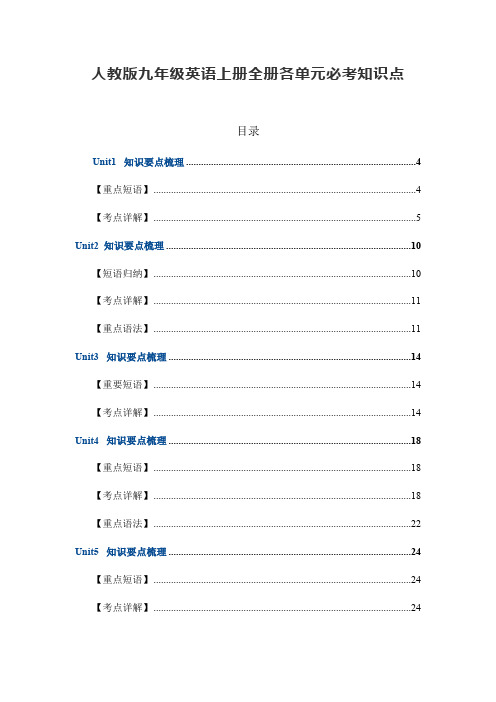
人教版九年级英语上册全册各单元必考知识点目录Unit1 知识要点梳理 (4)【重点短语】 (4)【考点详解】 (5)Unit2 知识要点梳理 (10)【短语归纳】 (10)【考点详解】 (11)【重点语法】 (11)Unit3 知识要点梳理 (14)【重要短语】 (14)【考点详解】 (14)Unit4 知识要点梳理 (18)【重点短语】 (18)【考点详解】 (18)【重点语法】 (22)Unit5 知识要点梳理 (24)【重点短语】 (24)【考点详解】 (24)【重点语法】 (27)Unit6 知识要点梳理 (30)【重点短语】 (30)【考点详解】 (30)【重点语法】 (33)Unit1 知识要点梳理【重点短语】1. have conversation with sb. 同某人谈话2. too…to… 太……而不能3. the secret to… ……的秘诀4. be afraid of doing sth./ be afraid to do sth. 害怕做某事5. look up 查阅6. repeat out loud 大声跟读7. make mistakes in 在……方面犯错误8. connect ……with… 把……和……连接/联系起来9. get bored 感到厌烦10. be stressed out 焦虑不安的11. pay attention to 注意;关注12. depend on 取决于;依靠13. the ability to do sth.. 做某事的能力【考点详解】1. by + doing 通过……方式(by是介词,后面要跟动名词,也就是动词的ing 形式)2. talk about 谈论,议论,讨论The students often talk about movie after class. 学生们常常在课后讨论电影。
talk to sb= talk with sb 与某人说话3. 提建议的句子:①What/ how about +doing sth.? 做…怎么样?(about后面要用动词的ing形式,这一点考试考的比较多)如:What/ How about going shopping?②Why don't you + do sth.? 你为什么不做…?如:Why don't you go shopping?③Why not + do sth. ? 为什么不做…?如:Why not go shopping?④Let's + do sth. 让我们做…...吧。
九年级英语上册笔记知识点

九年级英语上册笔记知识点一、Unit 1 How can we become good learners?1. 重点单词。
- aloud:出声地;大声地。
例如:read aloud大声朗读。
- pronunciation:发音;读音。
注意其动词形式是pronounce。
- patient:有耐心的;n.病人。
be patient with sb.对某人有耐心。
- discover:发现;发觉。
强调发现原本存在但不为人知的事物。
- secret:n.秘密;秘诀;adj.秘密的。
the secret to………的秘诀。
2. 重点短语。
- by working with friends通过和朋友一起学习。
by+doing表示“通过某种方式”。
- make word cards制作单词卡片。
- listen to tapes听磁带。
- ask the teacher for help向老师求助。
- read aloud to practice pronunciation大声朗读来练习发音。
3. 重点句型。
- How do you study for a test?你是如何为考试而学习的?- I study by making flashcards.我通过制作抽认卡来学习。
- The more you read, the faster you'll be.你读得越多,你(阅读速度)就会越快。
(“the+比较级,the+比较级”结构,表示“越……,就越……”)4. 语法知识点。
- by的用法:- 表示方式、方法,意为“通过……;靠……;用……”,后接名词、代词或动名词。
例如:He makes a living by selling newspapers.他通过卖报纸为生。
- 表示时间,意为“到……为止;不迟于”,常与完成时连用。
例如:By the end of last month, we had learned 2000 English words.到上个月末为止,我们已经学了2000个英语单词。
九年级上册英语书笔记

九年级上册英语书笔记一、Unit 1 How can we become good learners?(一)重点单词。
1. textbook:n. 教科书;课本。
- 例如:Our textbooks are very useful for our study.(我们的课本对我们的学习非常有用。
)2. conversation:n. 交谈;谈话。
- 常构成短语“have a conversation with sb.”(与某人交谈),例如:I had a great conversation with my teacher yesterday.(我昨天和我的老师进行了一次很棒的交谈。
)3. aloud:adv. 大声地;出声地。
- 区别于“loud”(adj. 大声的)和“loudly”(adv. 喧闹地)。
“aloud”侧重于发出声音,让别人能听到,常与“read”搭配,如:Read aloud so that everyone can hear you.(大声朗读以便每个人都能听到你。
)4. pronunciation:n. 发音;读音。
- 例如:His pronunciation is very good.(他的发音非常好。
)5. sentence:n. 句子。
- 可以说“make a sentence”(造句),例如:Let's make sentences with these new words.(让我们用这些新单词造句吧。
)(二)重点短语。
1. by working with friends:通过和朋友一起学习。
- 在回答“How do you study for a test?”(你如何为考试而学习?)时可以说:I study by working with friends.(我通过和朋友一起学习。
)2. make word cards:制作单词卡片。
- 这是一种学习单词的有效方法,例如:I make word cards to help me remember new words.(我制作单词卡片来帮助我记住新单词。
九年级上册英语第三单元知识点总结

九年级上册英语第三单元知识点总结一、重点单词。
1. restroom.- 名词,意为“(美)洗手间;公共厕所”。
例如:I need to find a restroom.(我需要找个洗手间。
)2. stamp.- 名词,“邮票;印章”;也可作动词,“跺脚;盖章”。
- 作名词:He collects stamps.(他集邮。
)- 作动词:She stamped her foot angrily.(她生气地跺了跺脚。
)3. bookstore.- 名词,“书店”。
例如:There is a big bookstore near my school.(我学校附近有一家大书店。
)4. beside.- 介词,“在……旁边;在……附近”。
例如:The boy is standing besidehis mother.(那个男孩站在他妈妈旁边。
)5. postcard.- 名词,“明信片”。
例如:I sent a postcard to my friend.(我给我的朋友寄了一张明信片。
)6. pardon.- 可作名词,“原谅;宽恕;对不起”;也可作动词,“原谅;赦免”。
- 作名词:I beg your pardon.(请再说一遍。
)- 作动词:Pardon me for being late.(原谅我迟到了。
)7. washroom.- 名词,“洗手间;厕所”(尤指公共建筑物内的)。
例如:The washroom is on the second floor.(洗手间在二楼。
)8. bathroom.- 名词,“浴室;洗手间”。
例如:There is a bathtub in the bathroom.(浴室里有一个浴缸。
)9. normal.- 形容词,“正常的;一般的”。
例如:It's normal to feel tired after a long day.(漫长的一天后感到疲倦是正常的。
九年级上册英语第一单元知识点

九年级上册英语第一单元知识点一、重点词汇1、 textbook 教科书;课本2、 conversation 交谈;谈话3、 aloud 大声地;出声地4、 pronunciation 发音;读音5、 sentence 句子6、 patient 有耐心的;病人7、 expression 表情;表示;表达方式8、 discover 发现;发觉9、 secret 秘密;秘诀;秘密的10、 grammar 语法11、 repeat 重复;重做12、 note 笔记;记录;注意;指出13、 pal 朋友;伙伴14、 physics 物理;物理学15、 chemistry 化学二、重点短语1、 work with friends 和朋友一起学习2、 make word cards 制作单词卡片3、 read the textbook 读教科书4、 listen to tapes 听磁带5、 ask the teacher for help 向老师求助6、 study for a test 为考试而学习7、 watch videos 看视频8、 have conversations with friends 和朋友进行对话9、 read aloud 大声朗读10、 practice pronunciation 练习发音11、 learn grammar 学习语法12、 keep a diary 写日记13、 look up words in a dictionary 在字典里查单词14、 be patient 有耐心15、 improve speaking skills 提高口语技能三、重点句型1、— How do you study for a test? 你是怎样为考试而学习的?— I study by working with a group 我通过小组学习。
2、 It's too hard to understand spoken English 英语口语太难懂了。
英语九年级上册笔记
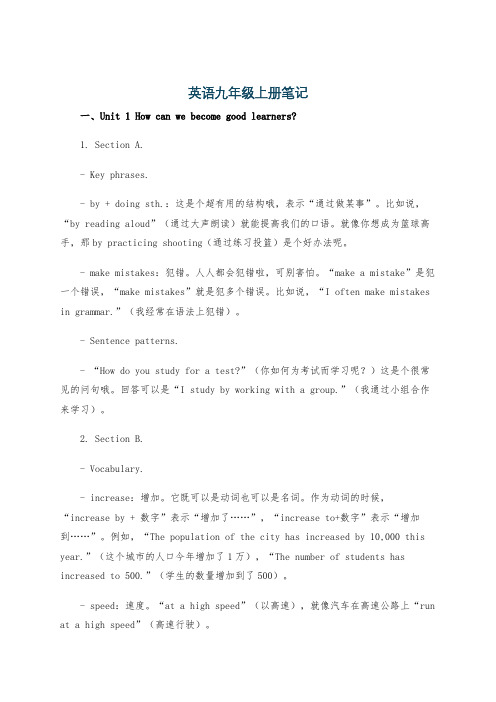
英语九年级上册笔记一、Unit 1 How can we become good learners?1. Section A.- Key phrases.- by + doing sth.:这是个超有用的结构哦,表示“通过做某事”。
比如说,“by reading aloud”(通过大声朗读)就能提高我们的口语。
就像你想成为篮球高手,那by practicing shooting(通过练习投篮)是个好办法呢。
- make mistakes:犯错。
人人都会犯错啦,可别害怕。
“make a mistake”是犯一个错误,“make mistakes”就是犯多个错误。
比如说,“I often make mistakes in grammar.”(我经常在语法上犯错)。
- Sentence patterns.- “How do you study for a test?”(你如何为考试而学习呢?)这是个很常见的问句哦。
回答可以是“I study by working with a group.”(我通过小组合作来学习)。
2. Section B.- Vocabulary.- increase:增加。
它既可以是动词也可以是名词。
作为动词的时候,“increase by + 数字”表示“增加了……”,“increase to+数字”表示“增加到……”。
例如,“The population of the city has increased by 10,000 this year.”(这个城市的人口今年增加了1万),“The number of students has increased to 500.”(学生的数量增加到了500)。
- speed:速度。
“at a high speed”(以高速),就像汽车在高速公路上“run at a high speed”(高速行驶)。
- Text understanding.- 这部分的课文告诉我们要有好的学习习惯,像做笔记啦(take notes),复习啦(review)。
九年级上册英语1到5单元知识点

九年级上册英语1到5单元知识点总结1. Unit 1: Best friends- Vocabulary: friendship,panion, trust, support- Grammar: present continuous tense, possessive pronouns - Topic: The importance of friendship and how to be a good friend2. Unit 2: English around the world- Vocabulary: bilingual, dialect, accent, globalization- Grammar:parative and superlative adjectives, adverbs of frequency- Topic: The influence of English as a global language and its variations in different countries3. Unit 3: Travel journal- Vocabulary: destination, itinerary, amodation, excursion- Grammar: past simple tense, past continuous tense- Topic: Sharing travel experiences, discussing favorite destinations, and describing past trips4. Unit 4: Great inventions- Vocabulary: innovation, breakthrough, patent, prototype- Grammar: reported speech, passive voice- Topic: Exploring the impact of inventions on society and discussing the process of innovation5. Unit 5: Health and well-being- Vocabulary: nutrition, fitness, well-being, hygiene- Grammar: modal verbs, conditional sentences- Topic: Promoting a healthy lifestyle, discussing the importance of exercise and balanced dietBased on the above knowledge points, it is clear that the ninth-grade English curriculum covers a wide range of topics from interpersonal relationships to globalmunication, from personal experiences to technological advancements, and from physical health to overall well-being. As a language, English not only serves as a means ofmunication but also provides insights into various aspects of life and society.In Unit 1, the focus on friendship highlights the importance of building and maintaining meaningful relationships. The vocabulary related to friendship emphasizes qualities such as trust and support, while the grammar lessons on present continuous tense and possessive pronouns enable students toexpress their thoughts and emotions more accurately. By incorporating these language elements into discussions about friendship, students are able to deepen their understanding of the topic and express themselves more fluently.Moving on to Unit 2, the exploration of English as a global language introduces students to the diversity of language and culture. The vocabulary related to bilingualism and globalization sheds light on the influence of English in different contexts, while the grammar lessons onparative and superlative adjectives provide a framework forparing and contrasting languages. Through discussions on language variations and the impact of globalization, students gain insights into the interconnectedness of the world and the importance of cultural exchange.In Unit 3, the travel journal serves as a platform for students to share their experiences and broaden their perspectives. The vocabulary related to travel and the grammar lessons on past tenses enable students to narrate their past experiences and plan future trips. By engaging in discussions about favorite destinations and travel itineraries, students not only enhance their language skills but also develop a sense of curiosity andadventure.Unit 4 delves into the realm of innovation and invention, offering students a glimpse into the world of creativity and problem-solving. The vocabulary related to innovation and the grammar lessons on reported speech and passive voice provide students with the tools to discuss technological advancements and their impact on society. Through debates on the pros and cons of various inventions, students develop critical thinking skills and an appreciation for human ingenuity.Finally, in Unit 5, the focus on health and well-being encourages students to reflect on their lifestyle choices and habits. The vocabulary related to nutrition and fitness,bined with the grammar lessons on modal verbs and conditional sentences, empowers students to advocate for a healthy lifestyle and express their concerns about public health issues. By engaging in conversations about the importance of exercise and balanced diet, students not only improve their language proficiency but also cultivate a sense of responsibility towards themselves and others.In conclusion, the ninth-grade English curriculum offers a richtapestry of topics that not only enhance language skills but also foster personal growth and broadened perspectives. By incorporating vocabulary, grammar, and topics that are relevant to students' lives, the curriculum provides an engaging and meaningful learning experience.As a writer, I personally find the integration of language learning with real-life topics to be highly effective in stimulating students' interest and fostering a holistic understanding of the English language. Furthermore, the emphasis onmunication skills and critical thinking in the curriculum equips students with the tools to navigate a rapidly changing world, both linguistically and intellectually.In summary, the ninth-grade English curriculum, with its diverse range of topics and language elements, not only prepares students for linguistic proficiency but also nurtures their intellectual curiosity and global awareness. Through the exploration of friendship, globalmunication, travel experiences, technological advancements, and health consciousness, students are not only equipped with language skills but also empowered to navigate theplexities of the modern world. This holistic approach to language learning is essential in nurturingwell-rounded individuals who are capable of engaging with the world in a meaningful and impactful manner.。
九年级英语一到三单元知识点

九年级英语一到三单元知识点Unit 1 How can we become good learners?一、重点单词。
1. textbook (n.) 教科书;课本。
2. conversation (n.) 交谈;谈话,常用于短语“have a conversation with sb.”(与某人交谈)3. aloud (adv.) 大声地;出声地。
区别于“loud”(adj. 大声的,常用来修饰名词,如a loud voice)和“loudly”(adv. 喧闹地,侧重于嘈杂、喧闹的声音)。
例如:Read aloud to practice pronunciation.(大声朗读来练习发音。
)4. pronunciation (n.) 发音;读音。
例如:His pronunciation is very good.(他的发音很好。
)5. sentence (n.) 句子。
6. patient (adj.) 有耐心的;n. 病人。
常用搭配“be patient with sb.”(对某人有耐心)。
例如:Our teacher is patient with us.(我们的老师对我们很有耐心。
)7. expression (n.) 表达(方式);表示;表情。
例如:Facial expressions can show our feelings.(面部表情能展示我们的情感。
)二、重点短语。
1. make word cards 制作单词卡片。
2. listen to tapes 听磁带。
3. ask the teacher for help 向老师求助。
4. read aloud 大声朗读。
5. have conversations with 与……交谈。
6. give a report 作报告。
7. word by word 逐字地。
8. the secret to... ……的秘诀。
例如:The secret to success is hard work.(成功的秘诀是努力工作。
(完整版)仁爱英语九年级上册知识点归纳
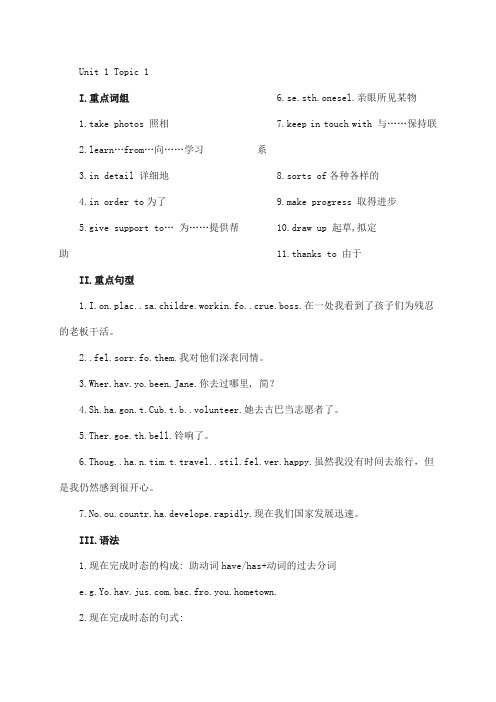
Unit 1 Topic 1I.重点词组1.take photos 照相2.learn…from…向……学习3.in detail 详细地4.in order to为了5.give support to…为……提供帮助6.se.sth.onesel.亲眼所见某物7.keep in touch with 与……保持联系8.sorts of各种各样的9.make progress 取得进步10.draw up 起草,拟定11.thanks to 由于II.重点句型1.I.on.plac..sa.childre.workin.fo..crue.boss.在一处我看到了孩子们为残忍的老板干活。
2..fel.sorr.fo.them.我对他们深表同情。
3.Wher.hav.yo.been.Jane.你去过哪里, 简?4.Sh.ha.gon.t.Cub.t.b..volunteer.她去古巴当志愿者了。
5.Ther.goe.th.bell.铃响了。
6.Thoug..ha.n.tim.t.travel..stil.fel.ver.happy.虽然我没有时间去旅行,但是我仍然感到很开心。
7.No.ou.countr.ha.develope.rapidly.现在我们国家发展迅速。
III.语法1.现在完成时态的构成: 助动词have/has+动词的过去分词.bac.fro.you.hometown.2.现在完成时态的句式:e.g.(1..hav.bee.t.Moun.Huan.wit.m.parents.(2) I haven’t seen him for a long time.(3) Where have you been?(4.——Hav.yo.eve.cleane..room?.——Yes..have..No..haven’t.3.have.ha.been.have/ha.gon.的区别have/has been to sp.表示曾经到过某地—— have/has gone to sp.表示已经去了某地e.g.(1..hav.bee.t.Moun.Huan.wit.m.parents. .(2.Sh.ha.gon.t.Cub.t.b..vo lunteer.Unit 1 Topic 2I.重点词组1. get lost 迷路2. each other 彼此3.at least 至少4take place发生5because of 因为6.b.stric.wit.sb.对某人严格要求.7.carry out 实行8.be short of 缺乏9.take measures to do sth.采取措施做某事10.be known as…作为……而著名11.work well in doing…在……方面起作用12.a couple of 一些13keep up with赶上,跟上II.重点句型1.Hav.yo.foun.hi.yet.你已经找到他了吗?2.——.reall.hat.t.g.shopping.我的确讨厌购物。
人教版九年级上册英语各单元语法重点梳理
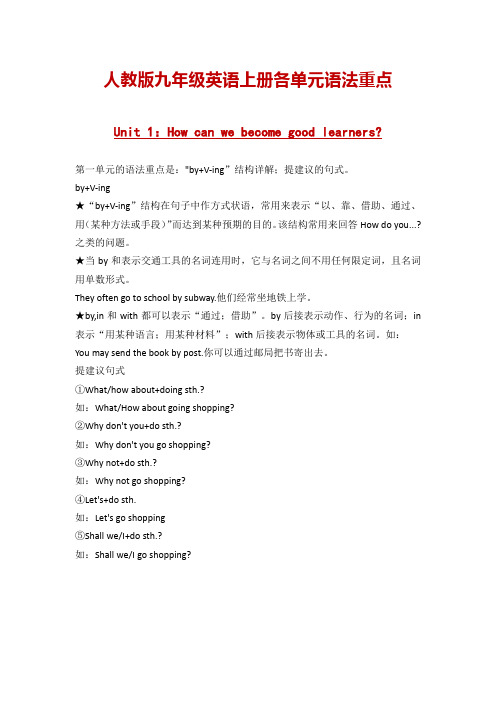
人教版九年级英语上册各单元语法重点Unit 1:How can we become good learners?第一单元的语法重点是:"by+V-ing”结构详解;提建议的句式。
by+V-ing★“by+V-ing”结构在句子中作方式状语,常用来表示“以、靠、借助、通过、用(某种方法或手段)”而达到某种预期的目的。
该结构常用来回答How do you...?之类的问题。
★当by和表示交通工具的名词连用时,它与名词之间不用任何限定词,且名词用单数形式。
They often go to school by subway.他们经常坐地铁上学。
★by,in和with都可以表示“通过;借助”。
by后接表示动作、行为的名词;in 表示“用某种语言;用某种材料”;with后接表示物体或工具的名词。
如:You may send the book by post.你可以通过邮局把书寄出去。
提建议句式①What/how about+doing sth.?如:What/How about going shopping?②Why don't you+do sth.?如:Why don't you go shopping?③Why not+do sth.?如:Why not go shopping?④Let's+do sth.如:Let's go shopping⑤Shall we/I+do sth.?如:Shall we/I go shopping?Unit 2:I think that mooncakes are delicious!第二单元的语法重点是:宾语从句;反义疑问句;表达“花费”。
宾语从句that,if和whatever引导的宾语从句:★宾语从句中连接词的选择1.由that引导的宾语从句:that在从句中无词义,不作任何成分,常可省略。
如:Jenny said(that)she could finish her painting before supper.I think(that)you are right.2.由if或whether引导的宾语从句:if或whether引导宾语从句时,一般可通用,都表示“是否”。
九年级上册英语第一单元知识点

九年级上册英语第一单元知识点第一单元是九年级上册英语的开篇单元,主要介绍了一些基础的英语知识点。
下面是对该单元的知识点进行详细解析。
1. 重点词汇和短语在这一单元中,我们需要掌握一些重要的词汇和短语。
例如:- greet:问候- introduce:介绍- classmate:同学- subject:科目- foreign:外国的- born:出生- age:年龄- nationality:国籍- speak:说话- speak English:说英语- surprise:惊讶- lucky:幸运的- guess:猜这些词汇和短语在日常英语中经常使用,掌握它们有助于提高我们的英语交流能力。
2. 问候和自我介绍这一单元还涉及到如何进行问候和自我介绍。
例如,我们学习了一些常用的问候语,如:- How are you?:你好吗?- Good morning/afternoon/evening:早上/下午/晚上好- Nice to meet you:很高兴见到你在自我介绍方面,我们需要能够介绍自己的名字、年龄、国籍等信息。
例如:- My name is Tom.:我的名字叫汤姆。
- I'm thirteen years old.:我今年十三岁。
- I'm from China.:我来自中国。
通过学习这些知识点,我们可以在日常生活中更加自如地与他人交流。
3. 数字和年龄在这一单元中,我们还需要掌握数字和年龄的表达方式。
例如,我们需要学习1-20的英文表达形式:- one:一- two:二- three:三- ...- twenty:二十此外,我们还需要学会询问他人的年龄以及回答这个问题。
例如:- How old are you?:你几岁了?- I'm fifteen years old.:我十五岁。
数字和年龄是我们生活中经常用到的概念,掌握它们对我们的英语学习非常重要。
4. 国籍和语言在这个单元,我们还学习了如何询问他人的国籍以及使用的语言。
英语九上1~3单元知识点
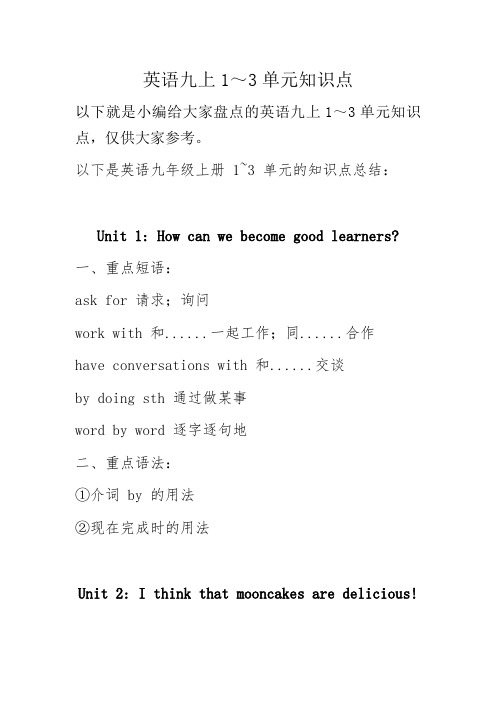
英语九上1~3单元知识点
以下就是小编给大家盘点的英语九上1~3单元知识点,仅供大家参考。
以下是英语九年级上册1~3单元的知识点总结:
Unit1:How can we become good learners?一、重点短语:
ask for请求;询问
work with和......一起工作;同......合作
have conversations with和......交谈
by doing sth通过做某事
word by word逐字逐句地
二、重点语法:
①介词by的用法
②现在完成时的用法
Unit2:I think that mooncakes are delicious!
the Water Festival泼水节
the Dragon Boat Festival端午节
the Spring Festival春节
the Lantern Festival元宵节
eat out出去吃饭
二、重点语法:
①宾语从句的用法
②感叹句的用法
Unit3:Could you please tell me where the
restrooms are?
一、重点短语:
on your right在你的右边
turn left向左拐
between...and...在......和......之间pardon me对不起;请原谅
come on快点儿
①问路与指路的表达方式
②形容词的用法
以上这些只是一些重点知识点的总结,你可以根据自己的需求进行更详细的学习。
九年级上册英语一至三单元知识点总结
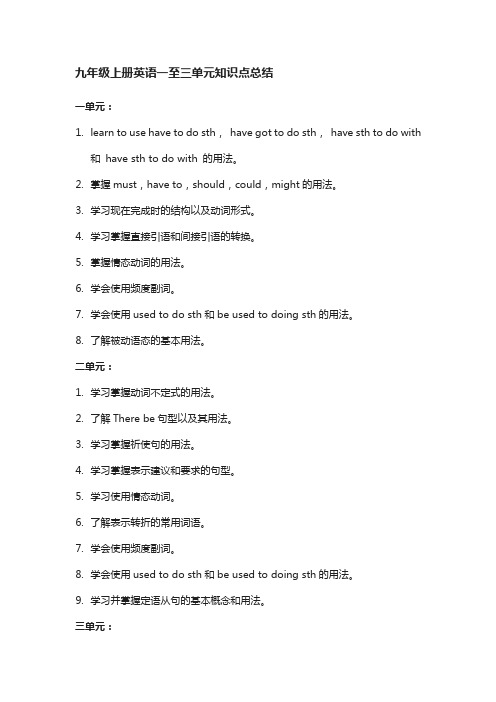
九年级上册英语一至三单元知识点总结
一单元:
1.learn to use have to do sth,have got to do sth,have sth to do with
和have sth to do with 的用法。
2.掌握must,have to,should,could,might的用法。
3.学习现在完成时的结构以及动词形式。
4.学习掌握直接引语和间接引语的转换。
5.掌握情态动词的用法。
6.学会使用频度副词。
7.学会使用used to do sth和be used to doing sth的用法。
8.了解被动语态的基本用法。
二单元:
1.学习掌握动词不定式的用法。
2.了解There be句型以及其用法。
3.学习掌握祈使句的用法。
4.学习掌握表示建议和要求的句型。
5.学习使用情态动词。
6.了解表示转折的常用词语。
7.学会使用频度副词。
8.学会使用used to do sth和be used to doing sth的用法。
9.学习并掌握定语从句的基本概念和用法。
三单元:
1.学习掌握过去进行时的用法。
2.学习掌握过去完成时的用法。
3.学习掌握现在完成进行时的用法。
4.学习掌握现在完成时的被动语态用法。
5.学习掌握情态动词的完成式用法。
九年级上册英语第一单元知识点
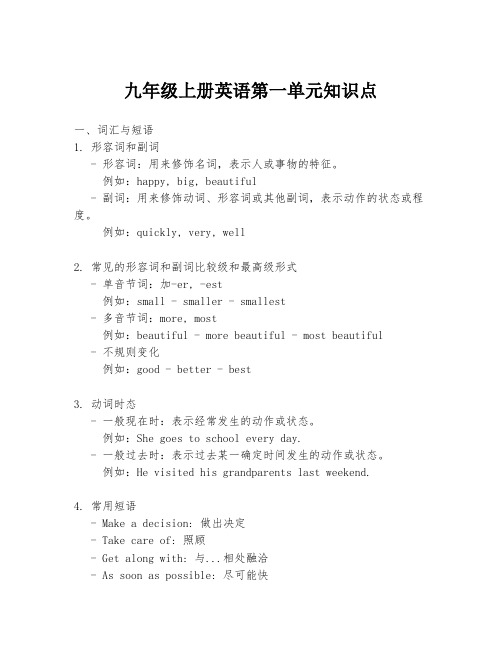
九年级上册英语第一单元知识点一、词汇与短语1. 形容词和副词- 形容词:用来修饰名词,表示人或事物的特征。
例如:happy, big, beautiful- 副词:用来修饰动词、形容词或其他副词,表示动作的状态或程度。
例如:quickly, very, well2. 常见的形容词和副词比较级和最高级形式- 单音节词:加-er, -est例如:small - smaller - smallest- 多音节词:more, most例如:beautiful - more beautiful - most beautiful- 不规则变化例如:good - better - best3. 动词时态- 一般现在时:表示经常发生的动作或状态。
例如:She goes to school every day.- 一般过去时:表示过去某一确定时间发生的动作或状态。
例如:He visited his grandparents last weekend.4. 常用短语- Make a decision: 做出决定- Take care of: 照顾- Get along with: 与...相处融洽- As soon as possible: 尽可能快二、语法点1. 比较级和最高级的构成- 规则变化:形容词和副词的比较级和最高级通常是通过在词尾加上-er和-est构成。
- 不规则变化:一些形容词和副词的比较级和最高级形式是不规则的,需要特别记忆。
- 双重比较级:使用more和less来构成比较级和最高级,适用于多音节和一些单音节形容词。
2. 比较级和最高级的用法- 比较级用于比较两者之间的差别。
例如:My sister is taller than me.- 最高级用于比较三者或三者以上的人或事物。
例如:Tom is the tallest student in our class.3. 时态的使用- 一般现在时通常用于描述习惯性动作或普遍真理。
人教版|九年级英语全册各单元必考知识点,期末高分必看!(上)附电子版。

人教版|九年级全册各单元必考知识点,期末高分必看!(上)附电子版。
今天老师给大家总结了人教版九年级上册unit1~unit6所有重难点和必考点,包括重点单词、短语、句型及其用法和语法考点,快期末考试了大家收藏起来好好学吧!Unit1【重点短语】1. have conversation with sb. 同某人谈话2. too…to…太……而不能3. the secret to………的秘诀4. be afraid of doing sth./ be afraid to do sth. 害怕做某事5. look up 查阅6. repeat out loud 大声跟读7. make mistakes in 在……方面犯错误8. connect ……with…把……和……连接/联系起来9. get bored 感到厌烦10. be stressed out 焦虑不安的11. pay attention to 注意;关注12. depend on 取决于;依靠13. the ability to do sth.. 做某事的能力【考点详解】1. by + doing 通过……方式(by是介词,后面要跟动名词,也就是动词的ing形式)2. talk about 谈论,议论,讨论The students often talk about movie after class. 学生们常常在课后讨论电影。
talk to sb= talk with sb 与某人说话3. 提建议的句子:①What/ how about +doing sth.? 做…怎么样?(about后面要用动词的ing形式,这一点考试考的比较多)如:What/ How about going shopping?②Why don't you + do sth.? 你为什么不做…?如:Why don't you go shopping?③Why not + do sth. ? 为什么不做…?如:Why not go shopping?④Let's + do sth. 让我们做…...吧。
九年级英语前三单元知识点
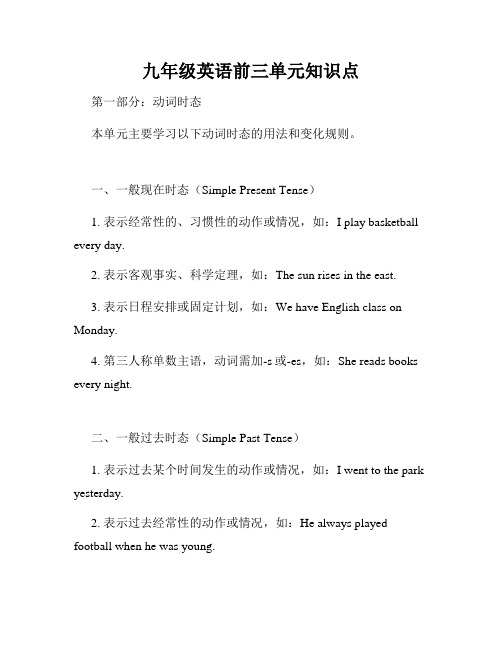
九年级英语前三单元知识点第一部分:动词时态本单元主要学习以下动词时态的用法和变化规则。
一、一般现在时态(Simple Present Tense)1. 表示经常性的、习惯性的动作或情况,如:I play basketball every day.2. 表示客观事实、科学定理,如:The sun rises in the east.3. 表示日程安排或固定计划,如:We have English class on Monday.4. 第三人称单数主语,动词需加-s或-es,如:She reads books every night.二、一般过去时态(Simple Past Tense)1. 表示过去某个时间发生的动作或情况,如:I went to the park yesterday.2. 表示过去经常性的动作或情况,如:He always played football when he was young.3. 动词过去式一般在词尾加-ed,如:They watched a movie last night.4. 部分不规则动词过去式需特殊记忆,如:go-went, eat-ate等。
三、一般将来时态(Simple Future Tense)1. 表示将来某个时间要发生的动作或情况,如:We will have a party next week.2. 表示将来打算、计划或意图,如:I am going to visit my grandparents this summer.3. 一般将来时态采用助动词will或be going to,如:They will study harder in the future.四、现在进行时态(Present Continuous Tense)1. 表示现阶段正在进行的动作,如:He is watching TV right now.2. 表示现阶段的临时行为或近期安排,如:I am staying at my friend's house this weekend.3. 现在进行时态由be动词(am/is/are)加动词现在分词构成,如:They are playing soccer at the moment.第二部分:代词本单元主要学习以下代词的用法和形式变化规则。
- 1、下载文档前请自行甄别文档内容的完整性,平台不提供额外的编辑、内容补充、找答案等附加服务。
- 2、"仅部分预览"的文档,不可在线预览部分如存在完整性等问题,可反馈申请退款(可完整预览的文档不适用该条件!)。
- 3、如文档侵犯您的权益,请联系客服反馈,我们会尽快为您处理(人工客服工作时间:9:00-18:30)。
精心整理
初三上册英语单元知识点
Unit2Topic1
10.inmanyways在许多方面
II.重点句型
1.Look,thereareseveralchemicalfactoriespouringwastewaterint othestreams.
看,有几家化工厂正往河里排放废水.
2.Everythinghaschanged.一切已发生了变化.
there .
健康
直接引语和间接引语
1.Grannysaid,“I’mfeelingevenworse.”
Grannysaidthatshewasfeelingevenworse.
2.“Doyoustillwanttolivehere,Granny?”thejournalistasked.
ThejournalistaskedGrannyifshestillwantedtolivethere.
3.“Howistheenvironmentaroundthisplace?”thejournalistasked .
7.preventfrom防止
8.greenhouseeffect温室效应
9.referto提到
10.dealwith处理
11.takeup占据
12.cutoff中断
II.重点句型
1.Asweknow,noneofuslikespollution.众所周知,没有人喜欢污
染。
人
d.
我们所做的,有些对地球很好,而有些不利。
6.Theycanalsopreventthewaterfromwashingtheearthaway.它们也能阻止水土流失。
7.Whenitrainsorwhenthewindblows,theearthistakenaway.天
一下雨或刮风,土就会被冲走或刮走。
III.语法
不定代词:
1.定义:指的是那些不指明代替任何特定名词或形容词的代词。
等。
5.insteadof代替
6.ontime准时
7.makesure确保
8.pushforward向前推
9.pushdown向下
10.pullup向上拉
II.重点句型
.
首先,
明天有许多繁重的活要干,今晚一定要早睡。
III.语法
并列句:由两个或两个以上并列而又相互独立的简单句构成。
结构为:简单句+并列连词+简单句
常用的并列连词有:and,or,but,while,notonly…butalso
2.Theyworkwell,buttheyareslowandcan’tr unforlong.
Unit3Topic1
制
9.haveno/sometrouble(in)doingsth.做某事没有/有些困难
10.onceinawhile=sometimes/attimes偶尔,间或
11.whenever=nomatterwhen无论何时
12.aswellas以及
13.mothertongue母语
14.taketheleadingposition处于地位
16.callfor号召
些麻烦。
6.It’susedasthefirstlanguagebymostpeopleinAmerica,Canada,A ustralia,GreatBritainandNewZealand.
它被美国、加拿大、澳大利亚、英国和新西兰的大多数人用作第
一语言。
7.Andtwothirdsoftheworld’sscientistsreadEnglish.
并且世界上三分之二的科学家用英语阅读。
三.语法学习
宾语)
规则与be作为连系动词时完全一样。
如:Englishiswidelyspokenaroundtheworld.(肯定式)
Englishisnotwidelyspokenaroundtheworld.(否定式)
IsEnglishwidelyspokenaroundtheworld?(疑问式)
Yes,itis./No,itisn’t.
2.被动语态的用法:(1)在没有指明动作的执行者或者不知道动作执行者的情况下可用被动语态。
如:Thiscoatismadeofcotton.这件大衣是棉制的。
(2)要强调动作的承受者而不是执行者时,用被动
)
.
1.---You’llhaveagoodchancetopracticespeakingEnglishthere.
---You’reright.
2.---ButI’mnotgoodatEnglish.I’malittleafraid.---Don’twor ry.
3.---IsSpanishsimilartoEnglish?---Notreally.
Topic2
11.generallyspeaking一般说来,大致上说
12.asforsb./sth.至于某人/某物
13.becloseto…靠近……
14.inperson身体上,外貌上;亲自
15.befoundof…爱好……
16.beforcedtodosth.被迫做……/forcesb.todo强迫某人做某事
17.evenworse更糟的是
信我就要飞往迪斯尼乐园了。
5.Ihope Iwon’thaveanydifficulty.我希望不会遇到什么困难。
6.Wheneveryouneedhelp,sendmean-mailortelephoneme.
无论何时你需要帮忙,给我发电子邮件或打电话。
7.NotonlychildrenbutalsoadultsenjoyspendingtheirholidaysinD isneyland.不但青少年而且成年人也喜欢到迪斯尼乐园度假。
三、语法学习
身?
如:Myuncleismeetingustomorrow.我叔叔明天会见我们。
Sheisbuyinganewbikesoon.她不久将买一辆新自行车。
四.交际用语:谈论不同国家英语的不同点并了解交际中的身体语言
1.Ican’tfollowyou.Canyouspeakmoreslowly,please?
2.Oh,itsoundsinteresting.
3.Ifyouwanttosucceedinmakingyourselfunderstood,youneedtokno
人
6..givesb.someadviceon/about…给某人一些有关……的建议
7..beweakin在……方面很差/begoodat在……方面很好
8..beafraidofdoingsth.害怕做某事9.makemistakes犯错误
10.takeadeepbreath深呼吸11.thebesttimetodo做某事的时间
12.dosomelisteningpractice做些听力训练13.replyto=answer 回答
二、重点句型
7.Butremembertochoosetheonesthatfityoubest.
但是记住要选择最适合你的一种。
8.IinsistthatyoupracticeEnglisheveryday.
我坚持认为你们每天都应该练习英语。
9.Believinginyourselfisthefirststepontheroadtosuccess.
自信是通往成功的第一步。
三、语法学习
wh-+todowh-是指when,where,which,who(m)及how等连接词,它
说,
(
不能说:Iwanttoknowwhattodo.)
四、交际用语:谈论如何学习英语
1.---…,butIhatetospeakEnglish inpublic.---You’dbetternot.
2.---Iknowit’sveryimportanttolearnEnglishwell.Butit’sdiff icultforme.---Me,too.
3.HaveyoueverhadanydifficultiesinstudyingEnglish?。
